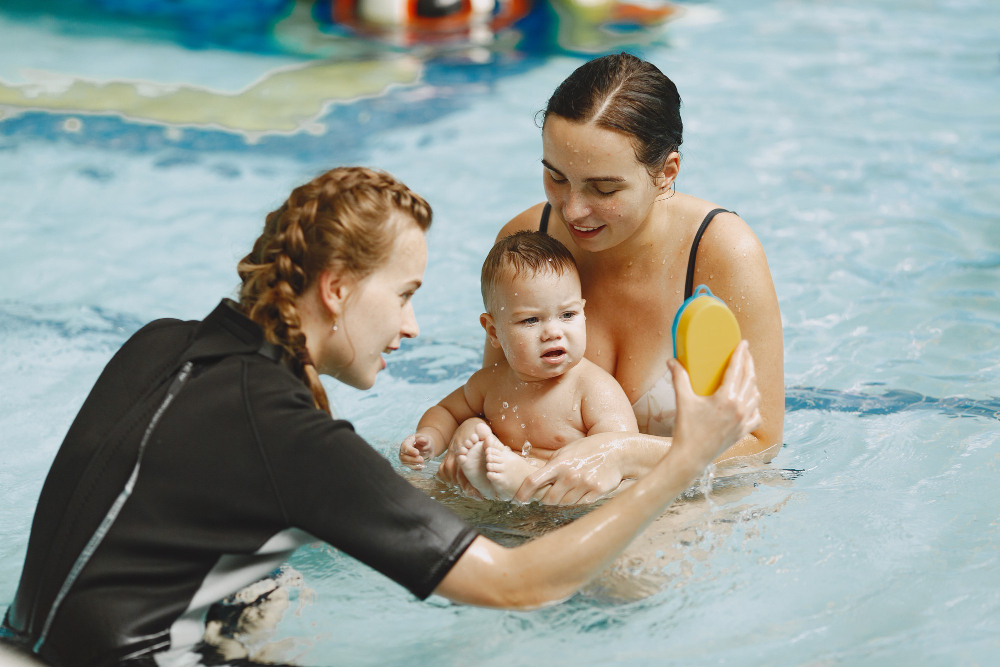Baby swim classes have become increasingly popular in recent years, and for good reason. Not only do these classes provide a fun and enjoyable experience for babies and parents alike, but they also offer a wide range of developmental benefits. Early childhood development is crucial for laying the foundation for future growth and learning, and baby swim classes can play a significant role in this process.
Physical Benefits: How Swimming Helps with Motor Skills and Coordination
Swimming is a fantastic way to improve both gross motor skills and coordination in babies. The water provides a unique environment that allows babies to move freely and explore their bodies in ways that may not be possible on land. By kicking their legs, reaching their arms, and moving their bodies through the water, babies can strengthen their muscles and improve their overall coordination.
In addition to improving gross motor skills, swimming can also help with fine motor skills. Babies can practice grasping objects in the water, such as floating toys or pool noodles, which can help develop their hand-eye coordination and dexterity. These activities can also enhance their ability to manipulate objects and improve their overall fine motor skills.
Specific exercises that can help with coordination include kicking exercises, where babies are encouraged to kick their legs while holding onto the side of the pool or using a kickboard. This helps strengthen their leg muscles and improves their ability to coordinate their movements. Another exercise is reaching for floating toys or objects in the water, which helps babies develop their hand-eye coordination and fine motor skills.
Cognitive Benefits: The Impact of Swim Classes on Brain Development
Swimming can have a positive impact on cognitive function in babies. The combination of physical activity, sensory stimulation, and social interaction that occurs during swim classes can help stimulate brain development and improve cognitive abilities.
Research has shown that swimming can enhance memory and learning in babies. The repetitive nature of swimming exercises, such as kicking and reaching, can help strengthen neural connections in the brain, leading to improved memory and learning abilities. Additionally, the sensory experiences that babies encounter in the water, such as the feel of the water on their skin and the sound of splashing, can also stimulate brain development and enhance cognitive function.
Specific exercises that can help with brain development include singing songs or reciting nursery rhymes while in the water. This engages both the auditory and language centers of the brain and can help improve memory and language skills. Another exercise is playing games that involve following instructions or solving simple problems, such as finding a specific toy or object in the water. These activities can help develop problem-solving skills and enhance cognitive abilities.
Emotional Benefits: How Swimming Encourages Socialization and Confidence
Swimming provides an excellent opportunity for babies to improve their socialization skills and build confidence. In swim classes, babies have the chance to interact with other babies and parents in a safe and supportive environment. This social interaction can help babies develop important social skills, such as taking turns, sharing, and cooperating with others.
Swimming can also boost confidence and self-esteem in babies. As they learn new skills and overcome challenges in the water, they gain a sense of accomplishment and build confidence in their abilities. This newfound confidence can extend beyond the pool and positively impact other areas of their lives.
Specific exercises that can help with emotional development include group activities that encourage interaction between babies, such as passing a ball or playing with floating toys together. These activities promote socialization skills and help babies build relationships with others. Another exercise is practicing floating or submerging underwater, which can help build confidence in the water and improve overall self-esteem.
Sensory Benefits: The Importance of Water Play for Sensory Integration
Water play is an essential component of baby swim classes and offers numerous benefits for sensory integration. The water provides a unique sensory experience, with its temperature, texture, and buoyancy stimulating the senses in ways that land-based activities cannot.
Water play can improve sensory integration by providing a variety of sensory input. The feel of the water on the skin, the sound of splashing, and the visual stimulation of the water’s movement all contribute to sensory development. This sensory input helps babies learn to process and integrate information from their environment, which is crucial for overall sensory development.
Specific exercises that can help with sensory development include pouring water over different body parts, such as the hands or feet, to provide tactile stimulation. This can help babies become more aware of their bodies and improve their ability to process sensory information. Another exercise is using different types of floating toys or objects with different textures, shapes, and colors. This provides visual and tactile stimulation and helps babies develop their sensory processing skills.
Safety Benefits: Teaching Babies Water Safety and Survival Skills
One of the most important benefits of baby swim classes is the opportunity to teach babies essential water safety and survival skills. Drowning is a leading cause of accidental death in young children, so it is crucial to start teaching water safety from an early age.
Swim classes can teach babies important water safety skills, such as how to float on their backs and how to hold onto the side of the pool. These skills can potentially save a baby’s life in the event of an accidental fall into a pool or body of water. By introducing these skills early on, babies can develop a strong foundation in water safety that will stay with them as they grow older.
Specific exercises that can help with water safety include practicing floating on their backs while holding onto a parent or instructor. This teaches babies how to relax and float if they were to accidentally fall into the water. Another exercise is teaching babies how to hold onto the side of the pool or climb out using a ladder or steps. This helps them learn how to exit the water safely and independently.
Bonding Benefits: How Swim Classes Can Strengthen Parent-Child Relationships
Swim classes provide a unique opportunity for parents and babies to bond and strengthen their relationship. The close physical contact and shared experiences in the water can create a deep sense of connection and trust between parent and child.
Swim classes can improve parent-child bonding by providing a dedicated time for parents to focus solely on their baby. In the water, parents can engage in activities such as singing songs, playing games, and practicing skills together, which can enhance the bond between them. The physical contact involved in holding and supporting the baby in the water also promotes a sense of security and attachment.
Specific exercises that can help with bonding include practicing skin-to-skin contact in the water, such as holding the baby against the chest while floating or swimming. This promotes a sense of closeness and security between parent and child. Another exercise is playing games that involve physical interaction, such as bouncing the baby up and down in the water or spinning them around gently. These activities can create joyful moments and strengthen the bond between parent and child.
Long-Term Benefits: The Lasting Effects of Early Swim Instruction on Future Skills
Early swim instruction can have long-term benefits for babies that extend beyond their early years. The skills and abilities developed through swim classes can have a lasting impact on their future growth and development.
One of the significant long-term benefits of early swim instruction is improved athletic abilities. Swimming is a full-body workout that helps develop strength, endurance, and cardiovascular fitness. By starting swimming at an early age, babies can develop a strong foundation in these areas, which can translate into improved athletic performance as they grow older.
Specific skills that can be improved through early swim instruction include coordination, balance, and flexibility. These skills are essential for a wide range of activities, such as sports, dance, and other physical pursuits. By developing these skills early on, babies can have a head start in their athletic endeavors and potentially excel in these areas.
Choosing the Right Swim Program: Factors to Consider for Optimal Developmental Growth
When choosing a swim program for babies, there are several factors to consider to ensure optimal developmental growth. It is essential to find a program that meets the individual needs of the baby and provides a safe and supportive environment for learning and growth.
One factor to consider is the qualifications and experience of the instructors. Look for programs that have certified instructors who are trained in teaching babies and have experience working with young children. This ensures that the instructors have the knowledge and skills necessary to provide a safe and effective learning environment.
Another factor to consider is the class size and structure. Smaller class sizes allow for more individualized attention and support, which can be beneficial for babies who may need extra assistance or have specific needs. Additionally, look for programs that offer a structured curriculum that focuses on age-appropriate skills and activities.
When choosing a swim program, it is also important to consider the safety measures in place. Look for programs that have lifeguards or additional staff members present during classes to ensure the safety of all participants. Additionally, check that the facility has appropriate safety equipment, such as life jackets or flotation devices, readily available.
The Power of Splash Science in Promoting Healthy Development in Babies.
In conclusion, baby swim classes offer a wide range of benefits for developmental growth in babies. From physical improvements in motor skills and coordination to cognitive enhancements in memory and learning, swimming provides a unique environment for babies to learn and grow. Additionally, swimming encourages socialization, builds confidence, promotes sensory integration, teaches water safety skills, strengthens parent-child relationships, and has long-term effects on future skills.
Parents are encouraged to consider enrolling their babies in swim classes to take advantage of these benefits and promote healthy development. By choosing the right swim program that meets the individual needs of their baby, parents can provide a safe and supportive environment for their child to thrive. The power of splash science is undeniable, and by embracing it, parents can give their babies a head start in life and set them up for success in the future.


